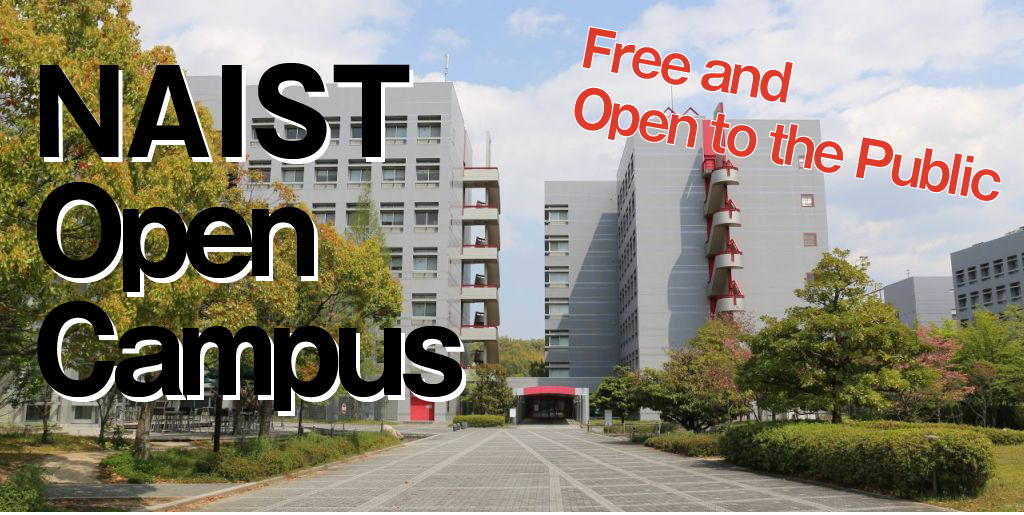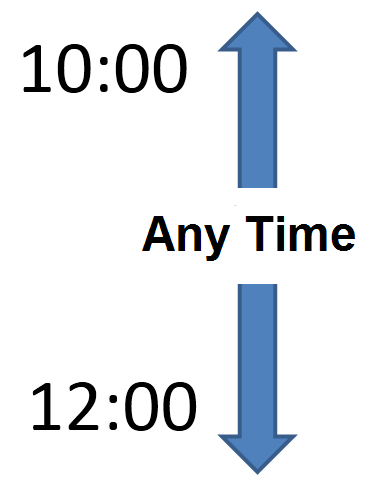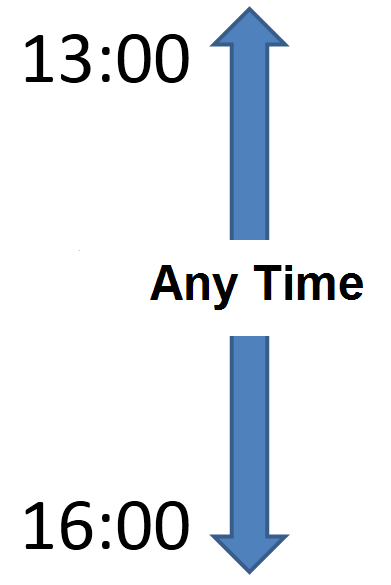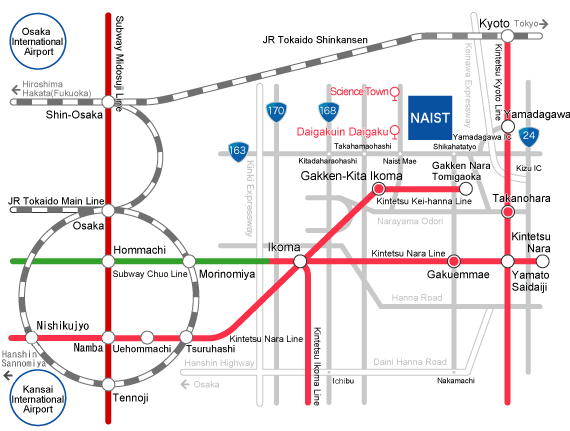|
Computer Science
|
|
We offer education and researches on computer hardware and information network to establish fundamental technologies for the next generation computer science, including dependable and green IT.
|
Computing Architecture Lab.
(Nakashima Lab.)

|
High-Speed, Low-Power, Variable-Reliability, New-Material Computers
|
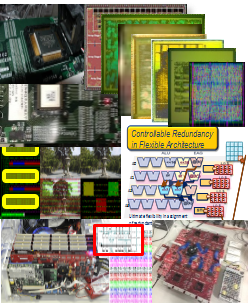
|
This laboratory focuses on the next generation computer system which specially targets at software/hardware
collaborations to break the performance wall, and address reliability and energy issues in current systems.
Ultra low-power accelerators and dependable new material computers are designed under JSPS(kibanA), JSPS(houga)
projects. We are expecting any students with a strong enthusiasm in computer engineering including both of
hardware and software.
|
★ Ultra Low-Power Accelerator
★ Tiny Film CPU
★ Reliable Accelerator |
・ x86 Co-Processing Accelerator EMAX
・ 8bit CPU EMIN to run 32bit ARM OS
・ Robustness Customizable CPU ERELA |
|
|
Dependable System Lab.
(Inoue Lab.)

|
Reliable VLSI Design, VLSI Testing, Distributed Algorithms, Parallel Algorithms
|
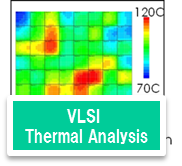
|
The laboratory is pursuing research on safe and secure systems including distributed systems with hundreds of
computers and VLSIs with billions of transistors. Dependability is the concept from user's point of view that
we can use systems reliably and securely. The servers with 12 Intel six-core processors or 6 SPARC quad core
processors support our research.
|
★ VLSI Design-for-Testability & Test Generation
Demonstrations using CAD Tools
★ Shared Memory Distributed Algorithms
・Reliable and Dependable VLSI Design |
・Power/Thermal-aware VLSI Testing
・IR-drop Analysis for Test Validation
・Data Mining for Test Cost Reduction
・Parallel Algorithms |
|
|
Applied Algorithmics Lab.
(Seki Lab.)

|
Security, Software, Database, Coding, Bioinformatics
|
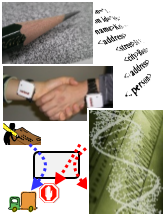
|
We develop mechanisms for computation and apply them to novel research problems, including security, software,
database, coding, bioinformatics, etc. Visit us at B507 and check our contribution in many different research
areas.
|
★ Trans-organizational role-based access control
★ Anti-phishing user authentication for novice users
★ Extremely fast analysis of RNA structures |
・Security in sensor networks
・Verification of security against inference attacks on XML data
・Ultra high-density two-dimensional barcode scheme |
|
|
Ubiquitous Computing Systems Lab.
(Yasumoto Lab.)

|
Context Recognition & Sensing, Ubiquitous Navigation, Mobile Networking, Ubiquitous Systems Simulation,
Social & Participatory Sensing
|

|
Ubiquitous computing systems provide users with more useful services at lower cost than ever before by processing,
aggregating, and analyzing real world data sensed with various sensors and by recognizing the physical situations
of the real space.
|
・ Support System for Emergency Rescue Operations
・ Control and Monitor System for Appliances through SNS
・ Auto Config and Selection for Comfortable Wireless
・Collaborative Development Environment for Ubiquitous
Applications via Virtual Space |
・ Energy Harvesting for Wireless Sensor Networks
・ Energy-saving Activity Navigation System
・ Estimation of Users Comfort Levels using Smartphones |
|
|
Foundations of Software Lab.
(Ito Lab.)

|
ITS, Mobile, Cloud Computing
|
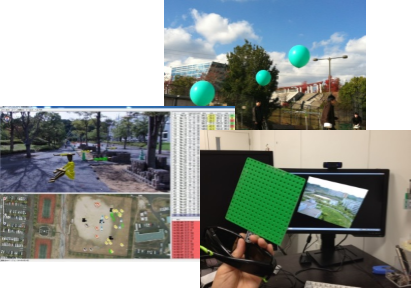
|
Division for foundations of software led by Professor Minoru Ito is engaged in research areas of intelligent
transportation systems (ITS), cloud computing, and mobile computing, in order to realize efficient algorithms
truly useful in the real world.
|
・ Navigation in Multilevel Parking Facility
★ Electronic Triage System
・ Localization in Underwater Sensor Networks
★ Adjusting Parameters in Stereoscopic 3D Video
・ Task Scheduling Considering Turbo-Boost |
|
|
Software Engineering Lab.
(Ken-ichi Matsumoto Lab.)

|
Empirical Software Engineering, Open Source Software Engineering, Software Security
|
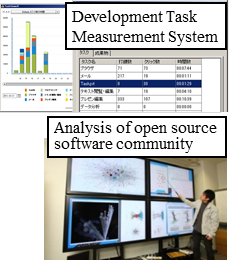
|
The software engineering lab. uses both theoretical and empirical approach to address various problems related
to software development methodologies, human computer interaction and software lifecycle management. We fully
exploits the potential of students' curiosity and creative thinking together with conventional research theories
and techniques to tackle new topics in software engineering.
|
・ Software Repository Mining
・ Measuring Developers' Activities
★ Automated Detection of Fault Prone Module in Open Source System |
・ Software Obfuscation / Watermarking
・ Global Software Development
★ TaskPit: Software Development Task Measurement System |
|
|
Software Design & Analysis Lab.
(Iida Lab.)

|
Software Design & Analysis, Repository Mining, Cloud System
|
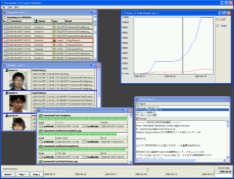
|
We study techniques for supporting the development and the design of Cloud systems. Especially, we focus on
modeling theory and implementation technique for design process and document. Also, we are doing collaborative
research with industry to develop practical approaches for software design.
|
★ Project Replayer
System for replaying development process
・ System for making development plan
・ Process complexity metric |
・ Cloud Systems using SDN (Software-Defined Network)
・ Analysis of bug fix processes
・ Analysis of the relationship between bug and refactoring
・ Feature extraction using source code analysis |
|
|
Internet Engineering Lab.
(Yamaguchi Lab.)

|
Cloud computing, Testbed, Security, Mobile Computing, etc.
|
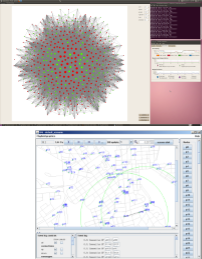
|
To enable continuous development for the Internet, we study the foundation and systematization of the Internet
meta system. The meta system supports scalability, plasticity, security and mobility in the Internet.
To contribute to society, we engage in constructing next generation networks through our research.
|
★ Miniature Internet
・ SOS Message Propagation via Smartphones
・ Mobile Data Offloading |
・ DoS Attacks Detection on ISM system
・ Anomaly Detection using Spectral Analysis
・ Weather Nowcasting via Smartphones
・ Quantifying Security in Multi-tenant Cloud Computing etc. |
|
|
Internet Architecture and Systems Lab.
(Fujikawa Lab.)

|
Internet, Mobile, Ubiquitous, Security
|
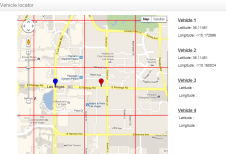
|
Main objective of our laboratory is to establish systems and applications for the Internet on cross-sectional
issues, especially related to mobile and ubiquitous computing, system operation, and information security.
At this open campus, we demonstrate "Information Sharing System" among mobile nodes for Intelligent Transport
System on IPv6.
|
★ VANET Services on IPv6
・ Cloud Computing
・ 4K Super High Definition Transmission |
・ Publish/Subscirbe System on Sensor Network
・ Analyzing Characteristics for Malware
・ Education Program for IT Security Experts (enPIT Security) |
|
|
|
Media Informatics
|
|
We offer education and researches on human-machine interaction and media to establish fundamental technologies to support people in advanced information society.
|
Computational Linguistics Lab.
(Yuji Matsumoto Lab.)

|
Natural Language Processing, Text Mining, Keywords, Web Text Analysis, Knowledge Infrastructure
|
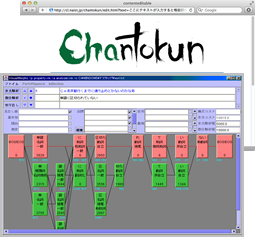
|
We focus on computational approaches to understanding natural language, the essence of human intelligence.
We make both fundamental and applied research on natural language analysis.
|
★ Japanese Morphological Analyzer "ChaSen"
★ Corpus Management and Search Tool "ChaKi"
★ Japanese Dependency Parser "CaboCha"
★ Predicate Argument Structure Analyzer "YuCha" |
★ Opinion Mining from the Web
★ Error Correction System "Chantokun", "CorrCha"
★ Technical Term Retrieval Assistance |
|
|
Augmented Human Communication Lab.
(Nakamura Lab.)

|
Augmented Human Communication (AHC)
|
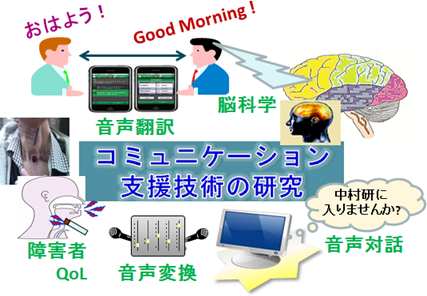
|
Toward enhancement of human communication abilities, AHC lab. is studying multilingual speech translation,
dialog system, communication QoL, silent speech interface, user-adaptive speech recognition/synthesis, and
brain analysis related human communication.
|
★ Speech translation
★ Speech Recognition
★ Speech Synthesis
★ Quality of Life |
★ Voice Conversion
★ Dialog System
★ Communication support for autism
★ Brain analysis related human communication |
|
|
Network Systems Lab.
(Okada Lab.)

|
Sensing, ICT for Surgery Support, Wireless Power Transmission, mobile communication and broadcasting
|
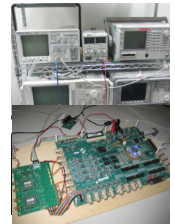
|
The laboratory develops wireless communication, broadcasting, and sensing system. And its embedding methods
are also studying. Broadband and high reliable signal processing is applied to wireless sensing technologies
for position location and surgery support systems.
|
★ Terrestrial-Digital Broadcasting Reception Software defined Radio Receiver
・ Surgery Support with RFID Sensor |
・ Position Location utilizing LCX Antenna
・ ESPAR Antenna assisted MIMO-OFDM
・ Integrated Optical and Radio Communications
・ Rain Rate Estimation using Milimeter-Wave Mesh Toplogy |
|
|
Vision and Media Computing Lab.
(Yokoya Lab.)

|
Coumputer Vision, Virtual Reality, Mixed Reality, Image Processing
|
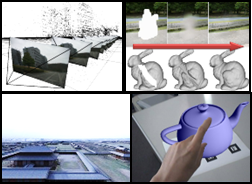
|
The laboratory develops technologies that extract 3D information from camera images and effectively show various
information in a computer to human. Research fields are Computer Vision, Virtual Reality and Mixed Reality.
|
★ Free View Generation for Robot Control
★ AR using Mobile Computer
★ Image, Video, 3D Model Inpainting
★ Real-time Marker Hiding in AR |
★ Augmented Telepresence using Aerial Omnidirectional Video
★ Position Estimation of Near Light Point using Clear Hollow Sphere
★ Camera Pose Estimation and 3D Modeling from Video Images
・ Inferring Important Regions Induced by Videographer's Intention
|
|
Interactive Media Design Lab.
(Kato Lab.)

|
Augmented Reality, Next Generation Interface, Information Search
|

|
Our laboratory is studying about not only the future interactive media itself but also media technologies,
human-computer interaction and data engineering which are needed to create innovative interactive media.
|
★ Design support system using projector-camera system
★ Transparent AR system
★ Window Management in Large Display Environment
・ Object Tracking Using Natural Features |
★ Effective XML search system
★ Context Aware Information Retrieval
★ Color Correction for Multiple Mobile Projectors |
|
|
Ambient Intelligence Lab.
(Hagita Lab.)

|
Ambient Intelligence, Computer Vision, Human Robot Interaction
|
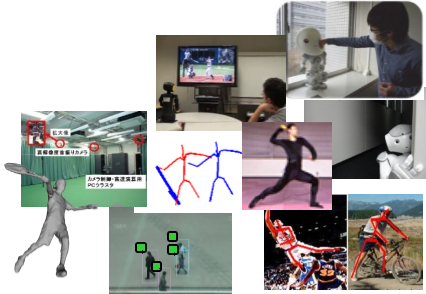
|
Our goal is realization of a safe, secure and comfortable life space for all members of society through the
application of ambient intelligence. Ambient intelligence which means our life space has intelligence is
developed by real world sensing, knowledge structuring and interaction for humans.
|
・ System with a Depth Sensor for Coaching Skillfull Human Motion
・ Grouping People for Tracking across non-overlaping Cameras
・ Purchase Estimation by Analyzing Actual Customer's Behavior |
・ A Social Media Mediated Robot for Elderly
・ Self Sacrifice Robot for Stress Elimination |
|
|
|
Applied Informatics
|
|
We offer education and researches on computational systems, robotics, and bio-information processing to discover vital function and life phenomena.
|
Robotics Lab.
(Ogasawara Lab.)

|
Intelligent Robot System, Visual Interfaces, Human Modeling
|

|
A robot is an intelligent system that obeys real world dynamics while interacts and communicates with human
beings. Such a system requires sensing the real world environment in real-time (real-time sensing). In our
laboratory, we develop real-time sensing technologies, such as robot vision and tactile sensing, and integrate
them into an intelligent system.
|
★ Human Mimetic Expression by Android Robot
★ Self Introduction by Dual-Arm Robot
★ Humanoid Robot Demostration |
・ Environment Modelling and Mobile Robot Navigation
・ Robotic Training System using Musculoskeletal Model
・ Designing the Robot Behavior by Reinforcement Learning |
|
|
Intelligent System Control Lab.
(Sugimoto Lab.)

|
Systems Control, Mechatronics, Learning
|
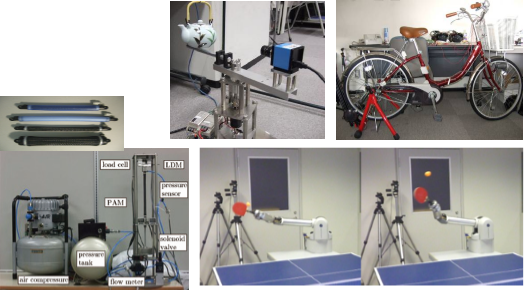
|
Our research interest covers basic theories and applications for Systems Control, Sensing & Signal Processing
and Machine Learning for Control.
|
★ Power Assist Technology for Bicycles
★ Modeling & Control of Artificial Muscle
★ Street Performance Robot via Visual Feedback |
★ Machine Learning for Robot Motor Skills
★ Feedback Error Learning for Control |
|
|
Mathematical Informatics Lab.
(Ikeda Lab.)

|
Mathematical Model, Machine Learning, Brain Informatics, Adaptive Systems
|
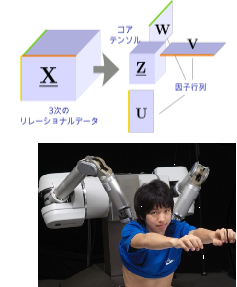
|
The laboratory studies Solutions with Mathematical Model, that include development and analysis of machine
learning methods, applications to mechanism of brain information processing, and applications to engineering
such as adaptive systems.
|
★ Mechanism of Decision Making by EEG
★ Robotics for Human Assistance and Care
★ Modeling of Driving Behavior
★ Control Application of 3D Measurement System |
★ Signal Processing of MEG
★ Gazing in Paint Observation
・ Analysis of Machine Learning Method
・ Machine Learning in System Biology |
|
|
Computational Systems Biology Lab.
(Kanaya Lab.)

|
Medical Bioinformatics, Secondary metabolite DB, Network Analysis, Bioimaging & Nano tech., Medical Imaging
|
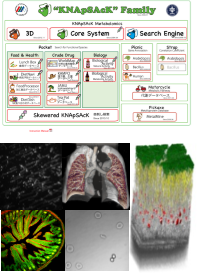
|
We have developed medicinal/edible plant DB, metabolite-species, effects of metabolites and plants to human
health. We also have developed a simulator for large-scale metabolism and an analyzer for molecular networks.
Furthermore, we research methods of measuring and processing technology for biological function, such as optical
tweezers, 3D imaging of cells, MR imaging, and processing technology of medical images.
|
★ Multifaceted Plant Usage Database
・Visualization System of Bio-Networks
★ Dynamic Simulation of Metabolic Flow |
・ Two-Photon Microscope Imaging
・MR Diffusion Imaging |
|
|
Large-Scale Systems Management Lab.
(Kasahara Lab.)
|
System Analytics, Network Science, Service Science, Algorithm
|
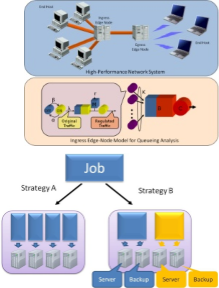
|
LSM Lab. research is aimed at developing performance modeling and algorithm techniques for design, control and
architecture of large-scale systems such as cloud computing, with which the resulting systems achieve high
performance and low vulnerability. Our research focus is on design framework, fundamental technologies and
highly-qualified services, in particularly for large-scale computer/communication network systems.
|
・ Large-Scale System Modeling
・Markov Analysis, Risk Analysis
・Queueing Theory |
・Network Science
・Large-Scale Simulation
・Service Science
・Online Algorithm
・Mechanism Design |
|
|
Neural Computation Lab.
(Doya Lab.)

|
Computational Neuroscience, Reinforcement Learning, Evolutionary Robotics
|
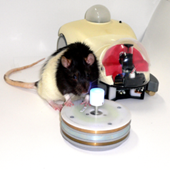
|
The goal of the laboratory is to establish computational models of the learning mechanism in animal brains,
and then apply the principles to information processing of artificial creatures. To achieve this goal, we are
building theoretical models of the molecular/neural networks involved in reward-based learning, and verifying
these models through animal and robotics experiments.
|
・ Multi-level Simulation of Basal Ganglia Circuit
・ Bayesian Connectivity Estimation from Spike Train Data
・ Quadruped/wheel Robot Experiments for Learning
and Evolution in Realistic Environment |
・ Recording Animal Brains in Stochastic-Reward Tasks
・ Recording Neuromodulators in Delayed Reward Tasks |
|
|
|
Collaborative Laboratories |
The Collaborative Laboratories provide opportunities for Master students to make a long-term visit to a private company or research institution and receive supervision for their Master thesis.
|
Molecular Bioinformatics Lab.
(AIST/Ueno & Fukui)
|
Bioinformatics, Molecular Dynamics Simulations, High Performance Computing
|
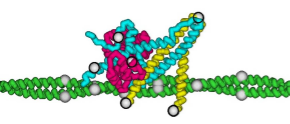
|
In order to understanding functions and mechanisms of proteins and biological macromolecules, this laboratory
focuses on computational studies and software development of bioinformatics based methods. Including an
exhaustive search strategy with large scale computers and method of experimental data analysis recovering
information loss in the incomplete data set, methods of computer science is applied in studies of life science
toward a knowledge discovery
|
・ Three Dimensional Reconstruction of Proteins by Electron Microscopy
・Molecular simulations of protein-protein interactions
・ Software development of the script editor for molecular animations |
|
|
Technology of Radiological Science Lab.
(National Cerebral and Cardiovascular Center Research Institute)
|
PET, SPECT, MRI, Molecular Functional Imaging, Medical Imaging Processing
|

|
The laboratory is attached to National Cerebral and Cardiovascular Center (NCVC) and aimed at developing
advanced medical imaging diagnostic devices and image processing technologies, which can provide functional
images in clinical services. It is a unique group of experts from various fields and collaborate with medical
doctors and companies.
|
・ Clinical Diagnostic Imaging (Quantification and standardization of SPECT image, Rapid Quantitative PET Systems, MRI)
・Molecular Imaging for Pre-Clinical Studies (Evaluation of New Therapies and Drugs, Developmental of Animal Models of Diseases) |
・ Key Technology Development (Image Processing: Image Reconstruction, Tracer Analysis Motion Correction, Image Registration,
High Spatial-Resolution SPECT Device, Computer Simulation)
|
|
Computational Neuroscience Lab.
(ATR)
|
Computational Neuroscience, BMI, Neural Decoding, Rehabilitation, Decision Making, Robotics
|
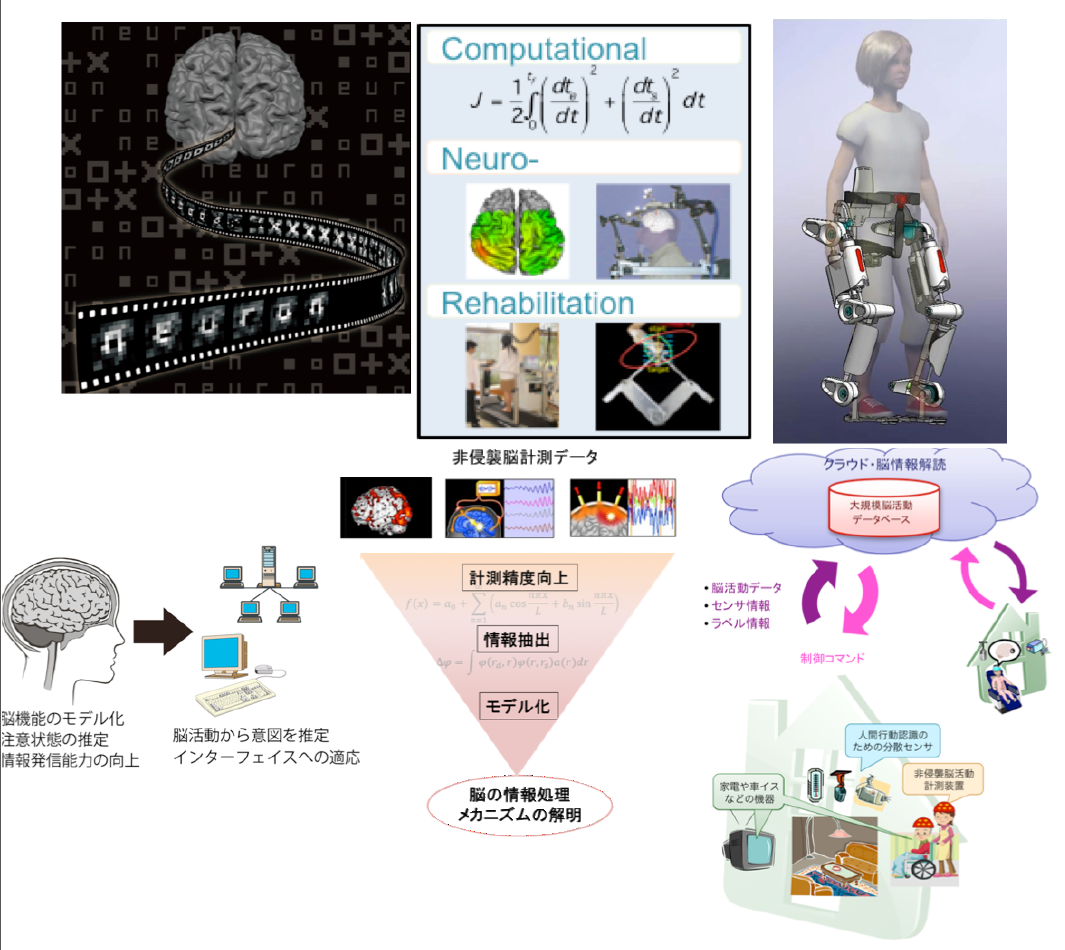
|
A profound idea in this course is that in order to really understand human brain function, you need to reconstruct a human being.
To clarify any brain function such as sensation, movement, communication, emotion or language we take the viewpoint of information
processing and integrate experimental means like neurophysiology, psychology, brain imaging and robotics into a computational
framework. Taking this approach, ATR is internationally recognized as a leading center for computational neuroscience, aiming at
cutting edge research.
(* Location: IS Building, 1st Floor (It will be updated as soon as the specific location is determined).) |
|
